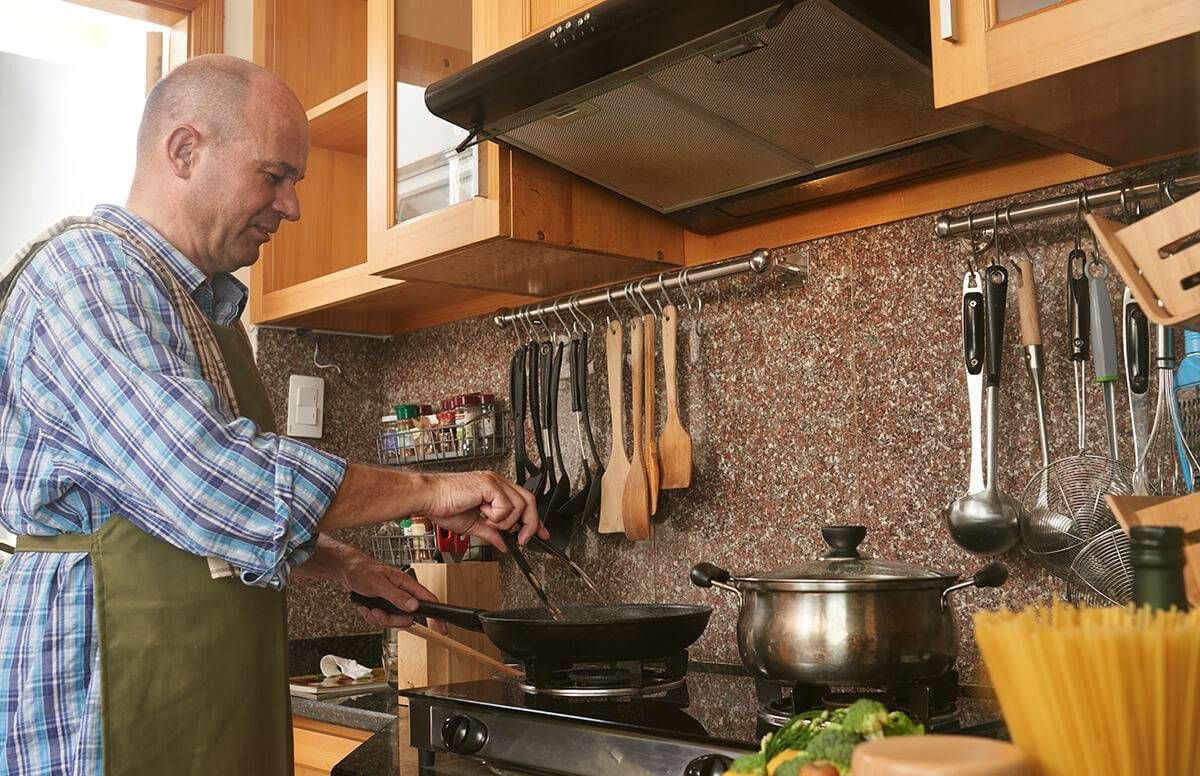When Your Spouse Is a Picky Eater
Avoiding a freekeh freakout and instilling healthy eating habits can be tough
“Dad’s going to freak out about the freekeh,” I whisper to my daughter.

“Let’s not tell him,” she suggests. “Maybe he’ll think it’s pasta.”
We’re cooking a vegetarian dinner, something healthy and different than the usual Chez Schulman fare. My daughter is living with us post-college, saving her paychecks until she can afford her own apartment.
“Don’t worry, I’ll plate it so it’ll look scrumptious,” she says, tossing olive oil and garlic with the ancient durum wheat supergrain, which allegedly has more nutritional benefits than a daily vitamin pill. She spreads the freekeh around a large glass platter, topping it with oven-roasted cinnamon-scented squash slices. She sprinkles it with crumbled feta, topping it off with microgreens.
Steve sits at the table. “What’s this?” He sounds dubious.
“Freekeh,” I say softly, gently.
He spoons a tiny portion onto his plate. “The farro is very chewy,” he announces, like a carnivore food critic forced to review a vegan restaurant.
“Freekeh,” our daughter corrects him.
“An interesting attempt,” he concludes after two spoonfuls.
Steve gets up and peers into the refrigerator, reminding me of my older brothers as teenagers, unable to find anything suitable to eat. “You’re letting the cold air out of the fridge!” my mother would scold.
Eggs crack, the frying pan sizzles. He returns to the table with scrambled eggs on leftover bread.
“We should’ve just called it pasta,” our daughter says, resigned.
My Picky Eater in the House
I vow not to turn into my mother, who allowed my father’s limited food palate to steer her secretive cooking behavior. Whenever she made pot roast, she carefully removed every trace of onion in the rich brown sauce afterwards. “Daddy thinks he hates onions,” she claimed. “But how can you make a pot roast without them?” He never knew he was being duped.
The older my husband gets, the more unadventurous an eater he has become.
He once wooed me with his global tastes, ordering espresso after our first date as if he were in a Jean Luc-Godard film. Impressing me by cooking dinners in his studio apartment, he steamed fresh vegetables I didn’t know existed. I’d grown up thinking peas and carrots were one vegetable; my mother heated them straight from a can, served swimming in mystery liquid. My culinary treat was selecting my favorite TV dinner on her nights out.
Steve and I enjoyed elaborate meals together; we sautéed, roasted, and baked our way to bliss. Then we had a baby whose middle name was “picky eater.” Macaroni and cheese every single night.
“At least you know what to make for dinner,” her pediatrician reassured me when I despaired.
No more wild-mushroom risotto or roasted salmon, which our daughter called “old lady smelly fish food.” Her idea of a night out in a Chinese restaurant: a bowl of plain white rice, grains tumbling from her chopsticks onto the floor.
What Changed Our Family's Eating Habits
Two events caused a food paradigm shift.
First, our daughter studied abroad in Paris, living with a host family whose père hunted deer in the country, and whose mere whipped up marquise au chocolate like a four-star pastry chef. Suddenly she was Instagramming photos of garlicky snails, which even I wouldn’t touch.
But as empty nesters, my husband and I had become lazy. We’d grab a falafel sandwich if we worked late, or just graze rather than bother with a balanced meal.
“All I need is soup and toast for dinner,” I joked, sounding like my grandmother. Alternative menu: cheese, olives, crackers and white wine. Steve became addicted to black bean burritos from his favorite take-out cantina.
Then, the paradigm changed again with our boomerang daughter moving her stuff back home, including recipes from her French "mother."
Now we are a threesome once more, reconvening after demanding day jobs to figure out a dinner that works for all.
My husband is often in denial about his blood sugar risks as a “borderline” Type 2 diabetic, still feasting on carbs and sneaking Ben & Jerry’s into the freezer. I’m the one with low cholesterol who eats buckwheat cereal and chai pudding; his ideal meal is pasta every other day with a chaser of fries.
I’m horrified to hear myself nag the way his mother scolded his father when he ordered chicken à la king in restaurants, against doctor’s orders. And when I watch my husband push the kale to the side of his bowl of bean soup that I’ve soaked and simmered all day, I can’t help but reprimand, “Eat your vegetables.”
“I did,” he insists. “There were a lot.”
I don’t want to be the mother of a toddler again. I refuse to call freekeh “pasta.” I won’t turn into my mother, or even worse, his. There must be a way to achieve dinner table détente.
Making Dinner Conversational, Not Confrontational
So I suggest we take turns, every three days, each creating a meal plan that will somehow satisfy all without putting anyone in a coma or bursting me out of my favorite jeans.
I vow not to remark about anyone’s vegetable intake or count the number of slices of bread inhaled in a given day. We are all adults, responsible for ourselves and our health destinies. Dinner should be delicious and conversational, not confrontational.
One day, our daughter will move out, maybe even cope with her own picky eater. My husband and I will grow older together, satisfied sometimes with just a little consommé for dinner. I hope he’ll surprise me occasionally and suavely order an espresso, like that young stranger in our new romance.
I promise I won’t remind him that caffeine keeps him up all night. Like onions in pot roast gravy, some things are best left unsaid.


